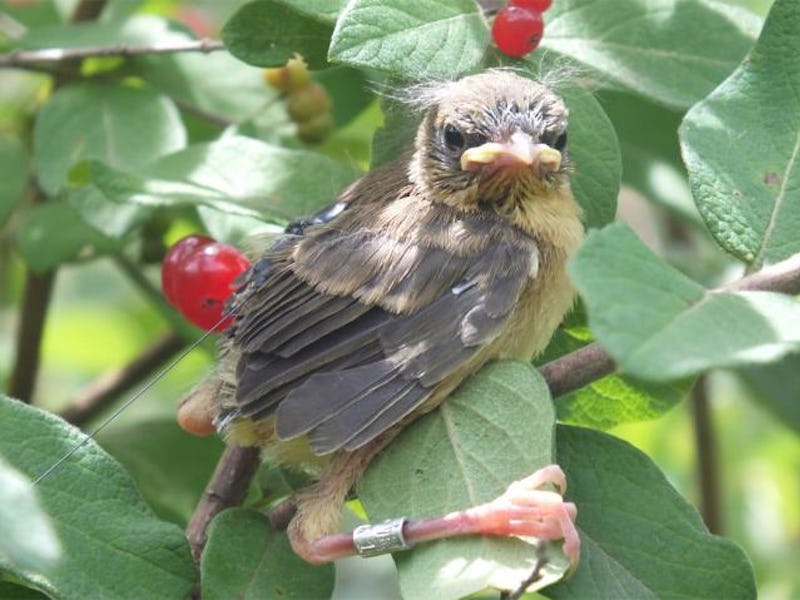Brutal bird parents keep the brood alive by kicking some out of the nest
Songbird parents aren't playing around.

It's a rite of passage in many countries: the children turn 18 and the parents gently usher their offspring out of the house so they can enjoy the empty-nester life.
But a study published Monday in the Proceedings of the National Academy of Sciences shows how songbirds take this phenomenon to extreme levels, kicking offspring out of the nest long before they're ready to stretch their wings.
Nestling dickcissels that were just banded and are close to fledging.
Forced out — Newborn songbirds, or fledglings, can experience a phenomenon called forced fledging, which occurs when "the young are forced from the nest usually due to some kind of threat, whether it be predation" or something else, Todd Jones, lead author of the study and graduate research assistant at the University of Illinois at Urbana-Champaign, tells Inverse.
But in this study, the researchers looked at what happens when the fledglings leave the nest for reasons other than forced fledging.
"If they're not being forced fledged, when are they leaving?" Jones asks. The researchers essentially wanted to know "whether the kids are choosing to leave or whether the parents are influencing them to to come out," he explains.
Jones and colleagues compared post-fledging survival rates in 18 songbird populations across North America. They came across some startling results for 12 of those species that seem to run counter to common sense.
"What our study is suggesting is that, based on survival rates, the kids are leaving earlier than you would expect them to," Jones says. "So they're leaving what is actually a safer nesting environment for a more dangerous post-fledging one."
From an evolutionary sense, this seems counterintuitive. You would anticipate that the baby birds would stay in the nest until they have the greatest chance of survival. But instead, these underdeveloped birds are heading out into the wild prematurely.
It turns out it makes perfect sense from the parents' perspective.
Golden-cheeked Warbler (Setophaga chrysoparia) parents caring for thier nestlings.
Strict songbird parents appear to maximize their entire brood's survival by sending off a few offspring prematurely, even if means those fledged chicks experience a "steep decline in survival right after they leave the nest" Jones says. This grim choice led to many of the prematurely fledged chicks Jones observed falling prey to all kinds of predators.
"The results really suggest these songbirds are likely manipulating these kids into leaving sooner than what we would predict," Jones says.
Master manipulators — How do the parents accomplish this feat? By strategically withholding food.
"There's some evidence suggesting that the adults are actually using food as a mechanism to tease them out. So they're reducing the provisioning rates as they approach fledging, to kind of use hunger as a way to get them out of the nest," Jones says.
The researchers confirmed their findings, in part, by using tiny audio transmitters placed on the birds.
"So far, the preliminary results suggest that as you get closer and closer to fledging, you get more and more chatter between the adults and the offspring," Jones says.
A Brown Thrasher (Toxostoma rufum) fledgling surveying its surroundings after leaving the nest
The results add fuel to the fire of a heated debate among songbird researchers as to how songbirds leave the nest. There are the "nestling choice" scientists, who believe that songbird adults have little to no influence on when their offspring leave their nest.
And then there are the scientists who argue the opposite under the "parental manipulation hypothesis." The research of Jones and his colleagues falls in the latter camp.
There "is a group of researchers that have been kind of tussling over what evidence supports what, and it's kind of remained this controversy in the songbird literature," Jones says. This study puts a gruesome twist on the warring theories, but more work will be needed to fully understand why chicks might fly the nest before their time.
Abstract: Parent–offspring conflict has explained a variety of ecological phenomena across animal taxa, but its role in mediating when song-birds fledge remains controversial. Specifically, ecologists have long debated the influence of songbird parents on the age of fledging: Do parents manipulate offspring into fledging to optimize their own fitness or do offspring choose when to leave? To provide greater insight into parent–offspring conflict over fledging age in songbirds, we compared nesting and post fledging survival rates across 18 species from eight studies in the continentalUnited States. For 12 species (67%), we found that fledging transitions offspring from comparatively safe nesting environments to more dangerous post fledging ones, resulting in a post fledging bottleneck. This raises an important question: as past research shows that offspring would benefit—improve post fledging survival—by staying in the nest longer: Why then do they fledge so early? Our findings suggest that parents manipulate offspring into fledging early for their own benefit, but at the cost of survival for each individual offspring, reflecting parent–offspring conflict. Early fledging incurred, on average, a 13.6% post fledging survival cost for each individual offspring, but parents benefitted through a 14.0% increase in the likelihood of raising at least one offspring to independence. These parental benefits were uneven across species—driven by an interaction between nest mortality risk and brood size—and predicted the age of fledging among species. Collectively, our results suggest that parent–offspring conflict and associated parental benefits explain variation in fledging age among songbird species and why post fledging bottlenecks occur.
This article was originally published on